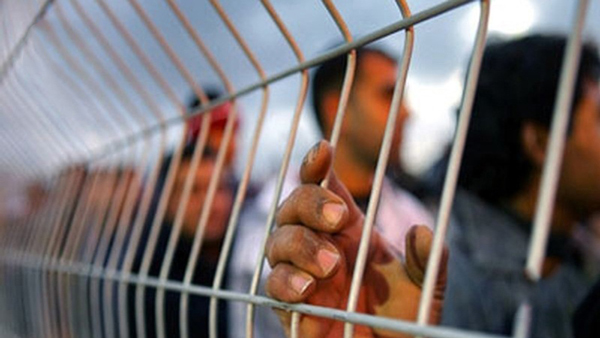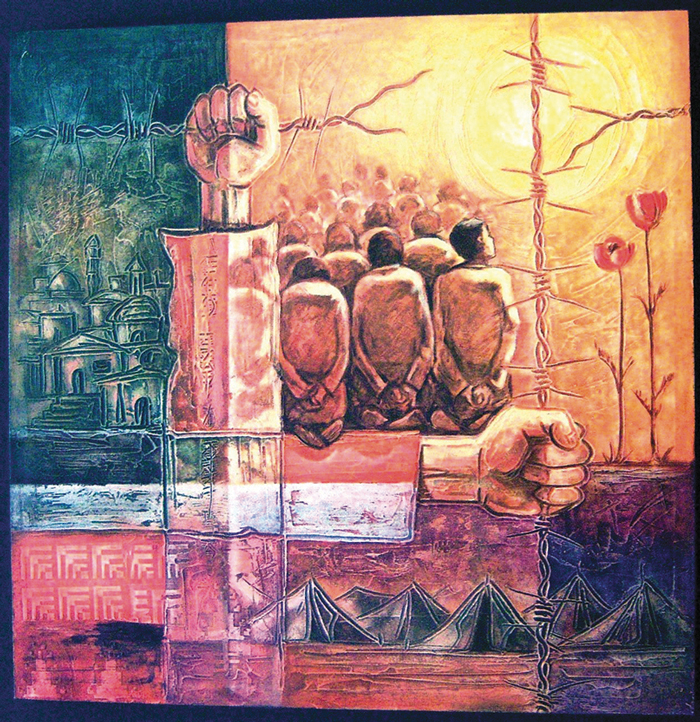
Immediately after the Israeli military forces occupied the Palestinian territory in 1967, the commanders of the West Bank and Gaza released orders that proclaimed their jurisdiction and established a legal system. Proclamation 1 announced the Israeli takeover of power to “preserve security and public order,” and Proclamation 3 established legal procedures. In the initial “Order Concerning Security Provisions,” the Israeli military as a belligerent occupation force recognized the applicability of the Fourth Geneva Convention, affirming that the military orders were to be subordinate to the Fourth Geneva Convention and explicitly stating that in times of contradiction between the orders and the Geneva Convention, “the provisions of the Convention shall prevail.” A subsequent version of the same order, however, retracted this section.i
♦ Since 1967, Palestinians who live under occupation have been subjected to Israeli military courts, which lack internationally recognized fair-trial guarantees. All Palestinians under occupation may be subjected to military detention, including Palestinian children, women, Legislative Council members, human rights defenders, and currently even a circus performer.
The present legislation does not address the serious security needs and interests of the occupied Palestinian people, nor does it guarantee their public safety, as required by the Hague Regulations of 1907 and the Fourth Geneva Convention of 1949, thus routinely contravening International Humanitarian Law (IHL). Neither does it limit the jurisdiction of the military court to the occupied territories: The military courts practice extrajudicial jurisdiction by prosecuting those engaged in any activity that Israel considers a threat to its security in any place in the world. However, these military orders are not implemented when perpetrated by Israeli settlers living in the West Bank.ii
Palestinian people under occupation are controlled by military orders that affect every aspect of their lives, ranging from education to health care, the economy, and civil and political life. Hundreds of thousands of Palestinian men, women, and children, be they politicians, activists, lawyers, teachers, doctors, or students, have been subjected to imprisonment over the past 50 years. Military orders have declared all political parties illegal and banned them. This ban includes the PLO, with whom the Israeli government has been engaged in negotiations since the beginnings of the Oslo process. The ban also applies to PLO member organizations, including Fatah, the PLO’s largest member party that has been leading the Palestinian Authority in the West Bank since its establishment in 1994. Thus, in 2011, Hussam Khader, a Fatah leader and Palestinian Legislative Council member was placed under administrative detention for his activism against the Palestinian political division between Gaza and the West Bank.

The British Emergency Security Regulations of 1945, adopted under the British Mandate, were adapted and implemented into Israeli military orders and into the penal code valid inside Israel in order to prohibit any act of resistance to the Israeli occupation. They serve as the basis for the above-mentioned ban of political parties and furthermore prohibit demonstrations and the distribution of any political material or publications. Consequently, Palestinians in the occupied West Bank have routinely been arrested, usually through night raids on their homes.
Under Military Order 101, a West Bank Palestinian can be arrested for civic activities, such as participation in protests, vigils, assemblies, or for waving flags or other symbols of political content. The order prohibits any person from printing or publicizing in the region any publications, notices, posters, photos, pamphlets, or other documents that contain material having political significance without a permit issued by the military commander. According to Order 101, hundreds of books are deemed illegal, and hundreds of activists and ordinary citizens have been arrested for posts on social media, at times for expressing solidarity with victims of Israeli aggression. In addition, all student organizations within university student unions have been declared illegal by Israeli military decisions and incriminate even normal student activities, such as holding book fairs affiliated with such student blocs.
Because military orders establish that gatherings deemed “political” are illegal, unless approved by the military commander, the organizers and participants in peaceful protests can be arrested – as has happened to Bassem as-Tamimi and Abdullah Abu Rahma who organize weekly nonviolent protests against settlement activities and the building of the Separation Wall on Palestinian land. Moreover, the Israeli civil code is used to repress the voices of Palestinian artists. Recent cases include poet Dareen Tatour from Reineh near Nazareth and novelist Khalida Ghusha from occupied Jerusalem, both of whom were charged for incitement under the civil code.
♦ Under the Israeli military system, Palestinians can be held under interrogation for up to 75 days without any charges, including up to 60 days with no access to an attorney. Administrative detention is indefinite detention without charge or trial, based on “secret information” that is not accessible to the detainee or to his or her attorney.
Since 1967, an estimated 800,000 Palestinians have been arrested under military orders – a number that constitutes a sweeping 20 percent of the population. As of January 2017, there were about 6,500 Palestinian political prisoners, including an estimated 300 children, 53 female prisoners, and 536 administrative detainees.iii
After the 1967 occupation, five military courts were established in the OPT, replacing the local courts that had existed under Jordanian and Egyptian control, in violation of IHL. The procedures under these military courts lack fair-trial standards and apply discriminatory procedures when compared to the laws that regulate Israeli criminal procedures. It is important to highlight that until the late 1980s there were no appeal courts. Until 2004, the courts’ panels of three judges did not require a legal background for all panel members, which means that hundreds of thousands of Palestinian prisoners were sentenced by soldiers who had no legal knowledge. Palestinian children as young as 12 years old were prosecuted in the same military courts as adults until 2010, when a special court was established, but whose rulings show no significant difference regarding the levels of protection or the lengths of sentences. Until 2012, Palestinian minors were treated as adults from age 16 years and older (as opposed to the international standard of 18 years).
Political leaders and activists have continuously been under attack through arrests and detention. In September 2005, more than 450 political activists were arrested from the West Bank in a clear attempt to affect the election of January 2006.iv In June 2006, the occupation forces arrested 48 elected parliamentarians, causing total paralysis of the Palestinian Legislative Council.v Since then, many of these parliamentarians have been re-arrested numerous times either under administrative detention or prosecuted under the charges of membership and support for an illegal organization. Currently, there are 13 parliamentarians under arrest, including 6 under administrative detention without charge or trial.
Israeli repression of Palestinians through detention is exemplified in the creation and implementation of two separate legal systems for individuals living in the same territory: Palestinians and Israeli settlers are not subject to the same legal codes. While Palestinians in the occupied West Bank can be held, by military orders, for up to 4 days without seeing a judge, an Israeli settler living in the occupied West Bank can only be held for up to 24 hours without seeing a judge. If a Palestinian living in the occupied West Bank is detained until the end of the trial proceedings, this can be for up to 18 months (further renewable), whereas for an Israeli settler who lives in the occupied West Bank this period is up to nine months (renewable with limitations). Sentencing provisions also differ significantly. For example, a Palestinian can be sentenced to life imprisonment for manslaughter (military order 1951), whereas an Israeli can be sentenced to 20 years imprisonment for the same crime.
Torture and ill treatment are widespread and systemic. These measures are used to coerce confessions and enable the prosecution process, which explains the high conviction rate within the military courts that prosecute Palestinians, which stands at 99.74 percent according to the most recently published numbers (2011).vi
Administrative orders of the Israeli military are used to ban Jerusalem residents from entering their own city, including director of youth programs at the Health Work Committees Da’oud Al-Ghoul. Other Jerusalemites are barred from entering the West Bank, as has been the case of Addameer field researcher Salah Hammouri.vii Administrative orders forbid thousands of Palestinians from leaving the occupied territories, and prevent families from obtaining visits to relatives living in Israel, including families of prisoners seeking visitation permits.
Furthermore, emergency security regulations that have been incorporated into the civil and military codes permit Israel to arrest thousands of people under a practice called administrative detention. Palestinians living in the oPt can be held without charge and held, based on secret evidence, for up to 75 days, 60 days of which they can be denied access to an attorney. This order can be, and frequently is, extended for indefinite periods. Administrative detention was used on a massive scale during the first Intifada against an estimated 10,000 Palestinians. Since the signing of the Oslo Agreement, it has been used massively, including against those who opposed these agreements: over 850 Palestinians from various political parties, including Fatah, were subjected to administrative detention between the signing of the Oslo Accords and the outbreak of the second Intifada in 2000. During the second Intifada, between March and April of 2002, between 2,500 and 3,000 Palestinians were placed under administrative detention. In 2015, the practice was used, for the first time in decades, against Palestinian children in Jerusalem. Administrative detention may amount to psychological torture; it has been condemned by the United Nations Committee against Torture and the UN Working Group on Arbitrary Detention and may constitute a crime of war in our context – as a form of systematic denial of fair trial against the Palestinian people.
♦ Torture and ill treatment of Palestinians are widespread in the military system and include physical violence and positional torture (stress positions) as well as psychological and mental pressure, including threats against the individual or family members. Palestinians are systematically subjected to transfers from the occupied territories into the areas of the occupying power, a practice that is illegal and in contravention of the Fourth Geneva Convention.
The continued prosecution of Palestinians under military law, the widespread arrests, detention, and serving sentences of an occupied people exemplify the apartheid nature of the Israeli regime. Through the law and practice of Israeli military courts that distinguish between criminal and security prisoners, the Israeli authorities practice an “institutionalized regime of systematic oppression and domination” by Israelis over Palestinians, “committed with the intention of maintaining that regime” in line with the definition of apartheid by the International Criminal Court.viii This system serves to repress Palestinians through lower trial guarantees, longer interrogation periods, and legal cover for torture.
» Adv. Sahar Francis has been the director of Addameer (Arabic for conscience), a prisoner support and human rights advocacy organization, since 2005, and has been a human rights legal advocate since 1994. She specializes in issues of Palestinian political prisoners, including ill treatment and torture, administrative detention, prison conditions, and prisoners’ rights. She has extensive litigation experience in the Israeli military court system as well as in Israeli civil courts.
i. Yesh Din, Backyard Proceedings: The Implementation of Due Process Rights in the Military Courts in the Occupied Territories, 2007, pp. 35–36.
ii. For more information, please visit the website of the Association for Civil Rights in Israel at http://www.acri.org.il/en/2014/11/24/twosysreport/.
iii. Addameer statistics, January 2017.
iv. Addameer court monitoring, 2005.
v. Addameer documentation, 2006.
vi. Official Report of the Work of the Military Courts in the West Bank in 2010 (Hebrew), published in 2011, Military Courts Report 2010.
vii. Addameer Documentation and Legal Representation, 2016.
viii. UN General Assembly, Rome Statute of the International Criminal Court (last amended 2010), July 17, 1998, article 7(2).


